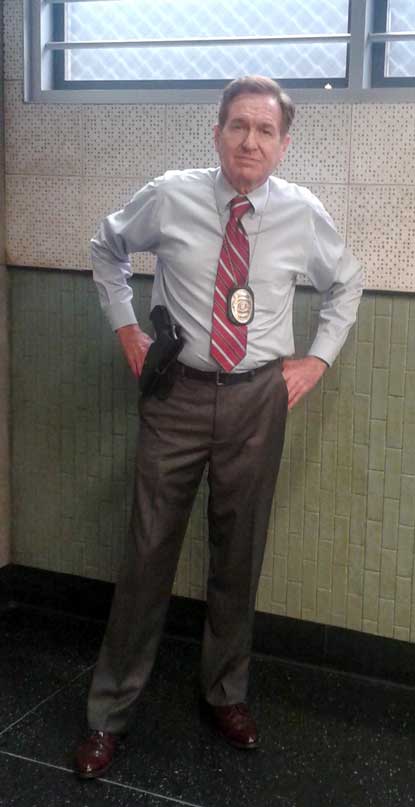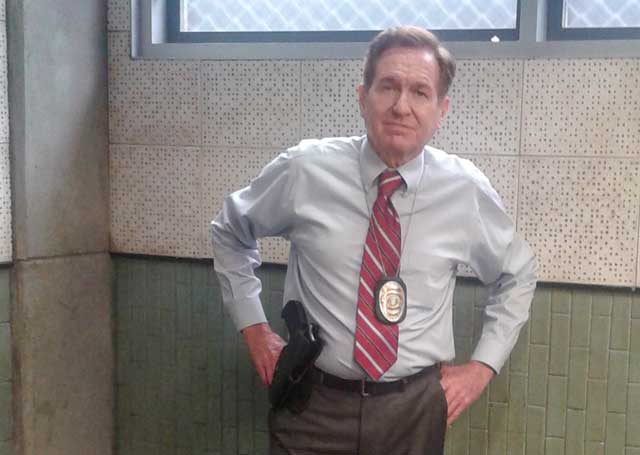
Photo courtesy Steve Olim.
[dropcap]Back[/dropcap] in the late ’60s, my friend Steve Olim and I made a couple of movies, using ourselves and some of our fellow Oklahoma State University students as actors and crew. Done well before the video and digital revolutions, these short, silent pictures were shot on 8mm film; one of them, a comedy that Steve directed called The Hitchhiker, got a special screening at the OSU Student Union right before a Clint Eastwood feature.
We had the filmmaking bug then, and we’ve both had a hard time shaking it ever since. Steve had it so bad during his OSU days that one evening he sought out the Los Angeles telephone book in the college library, took down the names and addresses of every movie and TV studio he could find, went back to his dorm room and wrote them all about the possibility of a summer job. A personal letter from a Columbia Pictures executive led to his working two summers handling administrative affairs for that studio’s makeup department.
A naturally gregarious guy, Steve became chummy with several big-name actors during his Hollywood time, something I found out firsthand when we took a trip West in 1971, just before I went on active duty with the Naval Reserve. We visited the set of the TV series Bewitched, where star Elizabeth Montgomery greeted him like a returning brother; got VIP seats to a taping of The Dean Martin Show, courtesy of series regular Kay Medford; and had cocktails at the home of Hayden Rorke, Dr. Bellows on I Dream of Jeannie.
Steve intended to continue working with Columbia after graduation, but those were the days of the Vietnam draft lottery, and the luck of the draw determined that he’d first have to do some time in the military. By the time he finished his service and headed back to California, he recalls, the executives who’d hired him had gone elsewhere.
“I was out of college, I needed to make money, so I stayed in Oklahoma and became a salesman,” he remembers. “But I think my heart was always in the [film] industry.”
Steve got a little closer to it in 1984, when he moved from Tulsa to Southern California. But he was still making his living by selling bank equipment. Eventually, he left that job and started day-trading in the stock market via computer from his home. That’s what he was doing in 2009, when a friend who lived nearby told Steve that he was thinking about pursuing jobs as an extra in movies and television. That rekindled Steve’s old filmmaking fire, and when his buddy headed to Burbank to register with Central Casting – the famous extra-casting company begun in the silent-movie era – Steve went along and signed up himself.
“I was in it for six months or a year,” he recalls, “and I did several TV shows and two feature films, Iron Man 2 and Valentine’s Day. It turns out that Valentine’s Day was produced by the son of Alan Rice, the man who gave me my summer job at Columbia-Screen Gems.”
The work was fun, he says, and the food was good and plentiful, but the pay was just a shade above minimum wage. So he returned to the stock market for another several years … until May 2016, when he decided to give moviemaking another try.
“I got tired of looking at the [computer] screen, and the business still had a draw for me,” he explains. So he committed to working as an extra – or, as he prefers, a background actor. And this time it took. Since then, he’s worked as a background actor in scores of television episodes, shot all over Southern California. As with his former job, however, he’s got to log plenty of time at the computer.
“Once you’ve filled out all the forms and gotten your picture taken, then you’re registered with Central Casting, and you can use your PC or cell phone to go to their site on Twitter and see what they’re posting, minute-by-minute,” he notes. “It might say, ‘Looking for Hispanic males and females between the ages of 18 and 25’ or ‘Looking for Caucasian males, 30s-60s, must have a waist no larger than 34.’ They’re very specific.
“So they’ll tell you what they’re looking for and usually where the shoot will be, and if you feel like you fit, then you get on the phone and call their number. Sometimes you get a busy signal, so you just keep calling. Sometimes you don’t get through, or you get a recording that says, ‘Sorry, this has all been booked.’ And then you look for the next thing.
“Other times, they don’t want you to call. They’ll say, ‘Send a picture of you in your business suit’ or ‘We want to see what you look like dressed as a homeless person.’ So you send a picture to them online with your information. That way, they can pull up the picture they took of you when you enrolled and compare it. If they want you, they’ll contact you and say, ‘Report to such-and-such studio tomorrow, 6 a.m. call time. You’ve got the job.’”
Steve’s been getting a lot of those lately, at least in part because of the movie-set professionalism he learned during those long-ago summers at Columbia Pictures.
“When you’re hired to do a job as a background actor,” he says, “you may not be paid a wealth of money, but you’re expected to be on time and be professional and not cause any disruption. Go where the director tells you, when the director tells you, and don’t trip over the cables.” He laughs. “When you walk, don’t act like a robot. Use natural facial expressions. If the scene is supposed to be a shocking one, where aliens invade or a cop runs in with a gun and yells while you’re a patron in a restaurant, act shocked.”
One of the disruptions forbidden on the sets is taking pictures of or trying to fraternize with what Steve calls the “first-team actors,” the stars and featured players. But sometimes the first-teamers interact with the extras. That was the case during a recent taping of the series Training Day, when star Bill Paxton overheard Steve making a crack about the plastic sushi he was supposed to be eating during a Japanese restaurant scene.
“It was when we broke for lunch,” he remembers. “All of a sudden, I heard this voice say, ‘Just where are you from?’ I turned around, and there’s Bill Paxton. I told him I was from Oklahoma, he said he was from Fort Worth, and we stood there and talked for a few minutes. He told me how much he loved Tulsa. Just a nice, congenial guy.”
That kind of conversation may not happen often when you’re a background actor, but, for Steve, lots of good come along with every job.
“To me it’s exciting,” he says. “To me it’s fun. You’re actually walking onto a studio lot. You’re getting past the gate. And while you’re a small part of things, you’re actually being a part of the creative process. And no two days are alike.
“Once, I was on a set where the production company had rented a strip club. I think it was for Rosewood. I was supposed to be a patron, leaning against the bar watching girls in bikinis dance. That was a pretty good gig. I live in Huntington Beach, and I could go down to the beach and watch girls in bikinis all day – but who’s going to feed me and pay me to do it?”


























